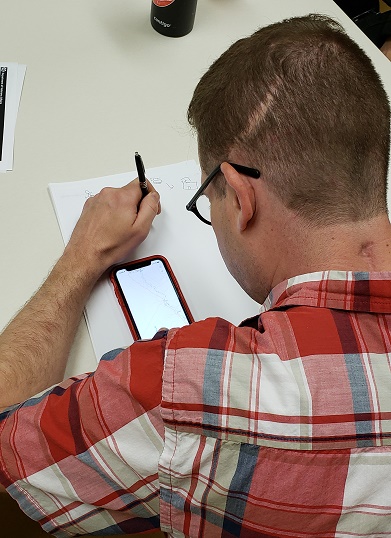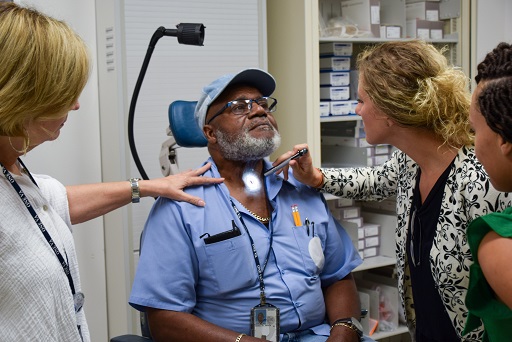Rehabilitation and Prosthetic Services
VA Speech-Language Pathology
Speech Language Pathology
The Department of Veterans Affairs (VA) offers comprehensive speech-language pathology services to Veterans and Servicemembers. VA speech-language pathologists are professionals dedicated to providing high quality, comprehensive, caring and timely services to individuals who have a wide range of communication and swallowing disorders. Speech-language pathology services include the early identification or screening, evaluation, and treatment for speech, swallowing, language, voice and cognitive- communication disorders. Services are provided based on applying the best available research evidence, using expert clinical judgment and considering the patient’s individual preferences and values.
Clinical Activities
 Speech-language pathologists are involved in the screening, evaluation and treatment of a broad range of communication and swallowing disorders, including:
Speech-language pathologists are involved in the screening, evaluation and treatment of a broad range of communication and swallowing disorders, including:
Speech Disorders: When a person is unable to produce speech sounds precisely or fluently then he or she may have a speech disorder. Difficulty pronouncing sounds, or articulation disorders, and stuttering are examples of speech disorders. Speech-language pathologists offer treatment for motor speech disorders and accent modification. An individual with a regional or foreign accent not be understood at school or work and may benefit from treatment.
Language Disorders: Difficulty understanding the spoken language and verbal expression is often due to stroke or traumatic brain injury. Aphasia is a language disorder frequently seen after trauma to the left hemisphere of the brain and includes difficulty in speaking, listening, reading, writing, and gesturing, but does not affect intelligence. Speech-language pathologists provide individual and group treatment for individuals with aphasia
Cognitive Disorders: Cognitive problems include difficulty with attention, memory, orientation, organization, and problem-solving. A speech-language pathologist will work with the patient and their family to improve cognitive skills or to develop compensatory strategies designed to improve ability to function at home, school, and work.
Voice Disorders: Speech-language pathologists provide evaluation and treatment for disorders of voice including pitch, loudness, and nasal resonance.
Swallowing Problems (Dysphagia): Speech-language pathologists specialize in swallowing disorders or dysphagia and evaluate individuals who are experiencing problems with eating and drinking. Dysphagia may co-exist with a wide variety of neurological or structural problems and treatment may include modification of food or liquids, positioning while eating, or exercises to improve swallow function.
Assistive Technology: Speech-language pathologists are specialists in providing recommendations for a wide range of technology for individuals that are unable to speak or may need compensatory strategies to assist with memory or organization. Examples of assistive technology include a picture board paired with a laser pointer, utilization of applications (apps) for smart phones for a tablet, or a device that produces computerized speech accessed by an eye gaze switch.
Medical Conditions Or Patient Populations
Speech-language pathologists serve Veterans and Servicemembers of all ages with speech, language, and swallowing disorders that may occur in conjunction with many medical problems, including:
- Brain injury including a stroke or trauma to the head
- Progressive neurological disorders such as Parkinson’s Disease, Multiple Sclerosis, Amyotrophic Lateral Sclerosis (ALS), Huntington’s Disease, muscular dystrophy and dementia or Alzheimer’s disease
- Injury or surgery to the head and neck
- Oral and laryngeal cancer
- Laryngeal abnormalities such as vocal cord paresis or paralysis
- Spinal cord injury and dysfunction
- Respiratory compromise including tracheostomy and ventilator dependence
Clinical Encounters
VA employs 459 speech-language pathologists and offers services to over 158 sites of care throughout the VA Health Care System. VA Speech-Language Pathology had over 374,000 patient encounters every year.
Treatment Settings
Speech-language pathologists often work as members of specialized interdisciplinary teams to provide coordinated, comprehensive care to Veterans and Servicemembers.
Speech-language pathology personnel provide services in outpatient clinics and inpatient settings (including medical centers and community living centers) and in their homes.
Telehealth is also available as a treatment modality to provide specialized treatment in settings closer to the individual’s home. This may involve telehealth services to VA outpatient clinics or the home.
Education
 VHA Speech-Language Pathologists have completed a Masters or Doctoral degree program from and Accredited program, completed a 9 month Clinical Fellowship Year and obtained a state license.
VHA Speech-Language Pathologists have completed a Masters or Doctoral degree program from and Accredited program, completed a 9 month Clinical Fellowship Year and obtained a state license.
Traineeships: Masters or Clinical Fellow
VA Speech Pathology Masters Traineeship is typically a 1 semester appointment for students in a Masters degree program.
A Clinical Fellow Traineeship is 1 year appointment with a salary and benefits. During that time trainees complete the requirements for an Certificate of Clinical Competence for the American Speech-Language Hearing Association. Trainees are closely supervised and obtain clinical contact hours in adult communication and swallowing disorders while working in a medical setting.
Speech Pathology Discipline Lead
Nan D. Musson, M.A, CCC-SLP, BC-ANCS
E-mail: vhaaspsprogramoffice@va.gov
Audiology & Speech Pathology Field Advisory Council
The Audiology & Speech Pathology Field Advisory Council (FAC) is a group of field-based, clinical leaders who advise the Speech Pathology Discipline Lead and Director for Audiology & Speech Pathology in areas of strategic planning, national objectives, and professional trends relevant to Speech Pathology services within the Department of Veteran Affairs. Additionally, the FAC helps to develop VHA evidence-based guidance documents and serves on planning committees for webinars and conferences. A primary charge to the FAC is to ensure active collaboration between VHA and field operations.
National Observances for Communication and Swallowing Disorders
May is Better Hearing and Speech Month. We need your help in not only celebrating our profession, but also an opportunity to spread awareness of the services Speech Pathologists provide. The American Speech-Language Hearing Association* provides ideas and resources for celebrating the month.
June is National Aphasia Awareness month and Dysphagia Awareness month. The National Aphasia Association and Aphasia Hope Foundation* provide suggestions for sharing information regarding aphasia rehabilitation and strategies for communication partners.
*The links above will take you outside of the Department of Veterans Affairs Website. VA does not endorse and is not responsible for the content of the linked websites.
VHA Directive 1170.02(1) - VHA Audiology and Speech Pathology Services



















